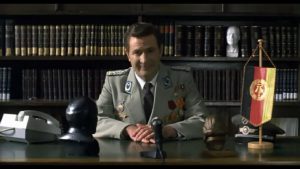Wolfgang Becker’s film Goodbye, Lenin (2003) portrays a tragicomic story of an East German family mirroring the historical changes after the fall of Berlin Wall. The hero Alex fabricates an elaborate fantasy of pre-fall-of-the-Wall life for his mother who suffers with amnesia, since her fragile heart cannot get excited by the drastic social change. Alex’s mother is a loyal communist in the German Democratic Republic, and she has raised her two children alone after her husband left their family and escaped to West Germany in 1978. In order to conceal the unification of Germany, Alex works with his friend Denis, an amateur filmmaker, to produce a series of TV news programmes that imitate those of East Germany (figure 1). At first, Alex utilises the faked TV news to interpret those events that his mother witnesses that suggest unification has occurred. For instance, a Coca-Cola advertisement banner is hung on a building outside the window of Alex’s mother’s bedroom (figure 2), then Alex fabricates a TV news to interpret that international scientists determined the patent of Coca-Cola belongs to one beverage industry in GDR, because original Coca-Cola was produced in a GDR experiment in the 1950s. However, one day his mother told her children an amazing secret: she should have absconded to West Germany with her husband in 1978, but she could not leave her children in the GDR. She deceived her children that her husband betrayed family, and she even hid all her husband’s letters to their children. Alex is shocked that his mother never trusted the country that she worked for. Alex finds his father’s address from those letters and thy have a short meeting, he then produces a TV news programme to reinterpret the fall of Berlin Wall (GDR accepted immigrants from West Germany after the ruin of capitalism) for his mother, thus he also reaches a reconciliation with his parents. In this blog, I would like to analyse how the Ostalgie mood is presented in the relationship between Alex and his mother, and how Alex’s parent is a metaphor for the GDR and West Germany. As a young person who has lived through huge historical changes, Alex has to rebuild his national identity from the gap between capitalism and socialism, and handle the complex mood for his disappeared motherland, the GDR.

Figure 1: The studio of Alex’s TV news programmes

Figure 2: Coca Cola advertisement
Ostalgie is a German term used for describing a nostalgic mood for East Germany. In Goodbye, Lenin Wolfgang Becker expresses the ostalgie emotion by deconstructing the historical event in an ironic way. Sigmund Jähn, the former GDR astronaut who is the first German in space, has been a taxi driver after unification. Alex knows him initially from TV news in 6 August 1978 but discovers his family was ruined on the same day. The scene shoes two Stasi officers interrogate Alex’s mother in the hall about her husband’s defection, at the same time the television broadcasts the news that Sigmund Jähn flew into space. Alex’s real father is absent in this scene and the national hero Sigmund Jähn might be identified as his spiritual father. After the fall of the Berlin Wall, Alex meets Sigmund Jähn on the way to his father’s house; Sigmund Jähn is his taxi driver. That is an interesting historical misplacement, the former space hero had once represented the socialist ideal and the honour of GDR, but now he is a disheartened ‘ordinary’ person after the unification of Germany. The huge social change has erased the extraordinary astronaut’s previous honour, so there is a wide gap between the GDR people’s socialist identity and disillusion after their pride dissipates with the nation.
Alex invited Sigmund Jähn to perform as the GDR’s new chairman, making an inaugural speech on the faked TV news. Thus, another historical misplacement happens when Sigmund Jähn sits in a public library, wearing old military uniform from a flea market, and makes a speech declaring the unification of East Germany and West Germany (figure 3). That scene shocks the readers and staff in the library, since the contrary version of real history becomes an ironic fantasy. However, it is also a very emotional sequence, as not only does it deliver Alex’s love for his mother but also rebuilds his belief in the GDR. Although the socialist ideal in the GDR already failed, in fact, even Alex’s mother, an idealistic communist who “marries the socialist fatherland” is proved to be disheartened with the GDR for a long period, Alex still rewrites his ideal history in TV news and approves of the previous idealism in the GDR. Alex’s mother, the metaphor of the GDR people’s motherland, does not believe the so-called socialist ideal as she already plans to abscond from the GDR, she even deliberately defames Alex’s father as a cheater in their marriage and hides all his letters. However, Alex realises he is already estranged with his father since the long-term separation. In the embarrassed meeting of Alex and his father, Alex looks like an incongruous invader sitting between his half-blooded brother and sister, and realises he is more closely related to his mother, the dying woman lying in hospital. When he identifies Sigmund Jähn, the taxi driver who used to be his spiritual father when he was a child, that former hero accepted his unexpected destiny. That sequence might be Alex’s spiritual farewell to fatherhood, he completes the rebuilding of identity and decides to coexist with “the Other”; that previous capitalist enemy.

Figure 3:
Sigmund Jähn makes a speech declaring the unification of East Germany and West Germany
Available at: https://img3.doubanio.com/view/photo/raw/public/p1691947844.jpg, accessed 11 July, 2017
Wolfgang Becker elaborately presents this political allegory as a family melodrama, various elements such as historical change, national identity, and ideological conflict are involved in the story about an ordinary German family, and therefore the tragicomic family melodrama reflects the collective memory after the fall of the Wall. However, the ostalgie mood in Goodbye, Lenin not only is presented by arousing collective memory, but also by guiding audiences to rethink German history. Through an ironic version of ideal history in faked TV news, Wolfgang Becker illustrates that ostalgie does not mean the GDR is an idealistic utopia, or that the people of the GDR are lost after the fall of Berlin Wall. Rather, people of the GDR have an ostalgie mood because that disappeared motherland shaped them, and they cannot abandon completely their previous illusions about the future and the collective memory about the GDR. The ideal history can possibly cure disillusioned people’s trauma after unification in a tragicomic way, rather than resulting from the GDR people’s dissatisfaction with the circumstance. In other words, there is no binary opposition between memory and reality as there is no real enmity between East Germany and West Germany, that previous ideal still comes true in other ways: the fact of unification also shows the socialist ideal of peace. Thus, the people of the GDR position themselves by rebuilding their common memory, and rethinking their belief with an ironic version of ‘ideal’ history.
